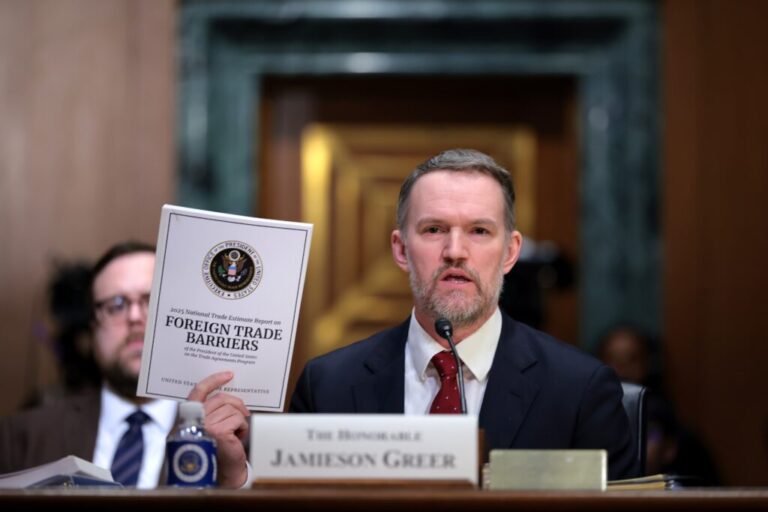U.S. Trade Representative Defends New Tariffs in Senate Hearing
On April 8, 2025, U.S. Trade Representative Jamieson Greer addressed the Senate Finance Committee regarding the administration’s recent imposition of extensive tariffs. During the meeting, which took place in the Dirksen Senate Office Building in Washington, D.C., Greer faced a bipartisan panel of senators expressing significant concerns from their constituents about the economic impact of these measures.
Key Points of the Hearing
Senator Thom Tillis from North Carolina candidly inquired, “Whose throat do I get to choke if this proves wrong?” highlighting the intense scrutiny the tariff policies are under. Greer defended the actions taken under the Trump administration, describing the tariffs as a necessary response to what he termed “non-reciprocal conditions” that have led to an unfavorable trade deficit.
Greer stated, “The president recognizes the urgency of the moment,” indicating that Trump’s national emergency declaration was driven by a need to reassert American manufacturing capabilities. He emphasized that this strategy marks a significant shift in trade policy, one that no previous president had laid out in such a detailed memorandum at the outset of their second term.
Implementation of Tariffs
The tariffs, which began after midnight following the hearing, affect major exporting nations including Vietnam, which faces a hefty 46% tax on goods, and Lesotho, which will see a 50% tariff. The move was significant enough to influence the global markets, as traders and economists saw responses ranging from outright retaliation to negotiations.
Despite these tax impositions, Greer noted that a number of countries have reached out for negotiations, which boosted market confidence after a recent downturn that erased substantial wealth.
Reaction from Senators
Among the senators, Mark Warner expressed frustration over the impact on trade relationships, questioning why allies with trade surpluses would be penalized. In contrast, Greer informed him that Trump’s tariffs had exempted critical sectors such as pharmaceuticals and semiconductors, which combined account for imports valued at approximately $665 billion.
Senator Ron Wyden challenged the administration’s approach, proposing a fast-track resolution to terminate the “chaotic tariff spree,” arguing that it undermines American families and businesses. His remarks underscored a growing dissatisfaction with the executive branch’s breadth of control over international trade.
Concerns for Small Business
Economic anxieties were particularly palpable among smaller enterprises, with Senator James Lankford from Oklahoma sharing concerns from local business owners. He relayed how one company had shifted its imports from China to Vietnam, only to now face the steep new tariff on Vietnamese goods. Greer did not provide a firm timeline for further negotiations to alleviate these pressures, stating, “I’m moving as quickly as possible.”
Global Reactions and Future Implications
The European Union is expected to respond with its own list of American products subject to tariffs, while leaders from nations like Israel and South Korea are already indicating adjustment measures to balance trade with the U.S. President Trump appeared optimistic via social media about ongoing talks with South Korean officials concerning automotive tariffs.
The unfolding situation suggests a turbulent period ahead for U.S. trade relations, where the implications of newly imposed tariffs may resonate through both domestic economies and international alliances.


